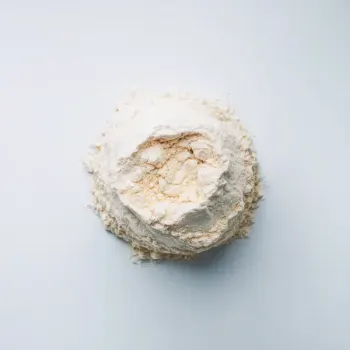Self-Rising Flour is a pre-mixed blend of flour, baking powder, and salt used for leavening baked goods, while Salt is a seasoning that enhances flavor and affects texture in cooking and baking.

Self-Rising Flour is a pre-mixed combination of all-purpose flour, baking powder, and a touch of salt. It's designed to give baked goods a nice rise without the need for additional leavening agents.

Salt, often referred to as the culinary world's cornerstone, is a mineral composed primarily of sodium chloride. It enhances flavor, preserves food, and serves various functional roles in cooking and baking.
Self-Rising Flour is a blend specifically crafted for leavening and structure in baked goods, while salt is a universal seasoning that balances and intensifies the inherent flavors of ingredients across all cooking types.

Your ultimate Recipe Box, Meal Planner, and Cooking Class all in one
Ideal for quick breads, scones, and pancakes, Self-Rising Flour simplifies the baking process. Expect a lighter texture and a consistent rise, perfect for Southern-style biscuits or a classic Victoria sponge cake. Salt is crucial in baking for flavor balance and can strengthen gluten structure in doughs. Use it in bread, cookies, and pastries to bring out sweetness, suppress bitterness, and add depth.
For a light, airy batter in fried foods, Self-Rising Flour creates a desirable puffiness and crispness. It's excellent for frying chicken, fish, or vegetables, giving a golden and tender coating. Salt isn't just for seasoning; it's also used to draw moisture out of foods before frying, which can lead to a crisper exterior. It's essential for seasoning batters and the finished fried product.
In doughs and pastries, Self-Rising Flour can simplify the process, but it's less common due to the need for precise control over leavening. It's best suited for simple, rustic pastries where a gentle rise is desired. Salt is important in pastry doughs for flavor and controlling yeast activity. It's a critical component in laminated doughs for croissants and in pie crusts where it enhances texture and taste.
Self-Rising Flour is similar in nutrition to all-purpose flour but includes added sodium from the baking powder and salt. Salt has no calories but should be used in moderation due to its sodium content.
| Nutrient | Salt ( per 100g ) | Self-Rising Flour ( per 100g ) |
|---|---|---|
| Fat | 0g | 1.7g |
| Sodium | 38758mg | 581mg |
| Calcium | 24mg | 146mg |
| Protein | 0g | 10.4g |
| Calories | 0 | 353 |
| Carbohydrates | 0g | 74.9g |
Yes, you can mix all-purpose flour with baking powder and salt in appropriate ratios to create self-rising flour.
Self-rising flour contains a small amount of salt, but additional salt may be needed depending on the recipe for flavor enhancement.
No, self-rising flour is best suited for specific recipes that require leavening. It's not suitable for recipes that require more control over the rise, such as yeast breads.
Salt helps control yeast fermentation in dough, leading to a slower, more consistent rise and better bread texture.
You can substitute self-rising flour with a mixture of all-purpose flour, baking powder, and salt. Typically, 1 cup of all-purpose flour plus 1.5 teaspoons of baking powder and 1/4 teaspoon of salt will suffice.